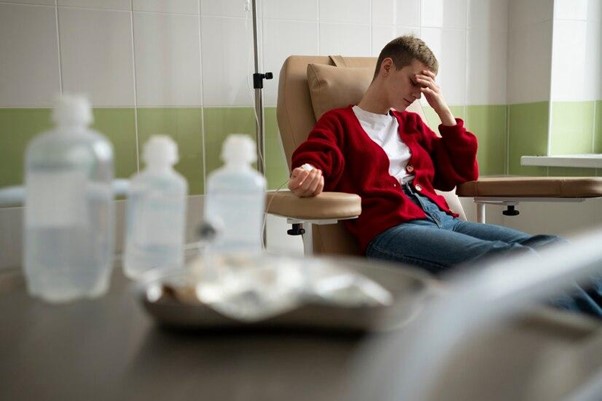Dirty Hands, Dirty Secrets: Diseases Caused by Poor Hygiene
The most frequent diseases caused by poor hygiene and unhealthy habits can put a stop to your enjoyable existence, ranging from fungal infections to bacterial invasions and parasite diseases.
Diseases Caused by Poor Hygiene and Their Symptoms
There are numerous diseases caused by poor hygiene, however, the following are the most common:
Fungal Infections
Ringworm: Ringworm is an itchy, circular rash that takes the shape of a ring on the buttocks, torso, arms, and legs. The colour goes from red on white skin to reddish, purplish, brown, or grey on black and brown skin.
Athlete's Foot: This condition typically originates between the toes as a result of sweating caused by tight-fitting shoes. It causes an itchy, scaly rash on the diseased area, which is frequently followed by peeling skin.
Candidiasis: Candidiasis is a fungal infection caused by the yeast Candida albicans. Candida typically lives on the skin or within the body, such as the mouth, throat, gut, and vagina. If the sickness spreads deep into the body before treatment, it might cause deadly health infections in the bloodstream, kidney, heart, or brain. Its appearance varies depending on its location; in the mouth, it appears as white patches, on the skin, as peeling or crusting, and in the genital areas, it changes the colour and thickness of the discharge.
Bacterial Diseases
Gastrointestinal Infections: A gastrointestinal infection is characterized by diarrhoea, vomiting, and abdominal pain.
Staph Infections: Infections caused by Staph bacteria, the symptoms vary depending on the type of infection; for example, if it is on the skin, it may appear as a pimple or boil, which is swollen, red, and painful. If it occurs on the bone, it can cause pain, swelling, and redness in the affected area. It can also cause food poisoning, with symptoms including nausea, vomiting, diarrhoea, and fever.
Parasitic Diseases
Scabies: It's an itchy skin rash caused by microscopic mites. Itching is common and often severe, and it is worse at night. Symptoms include thin, wavy tunnels formed on the skin by tiny blisters or bumps. It is commonly present in skin folds and other regions such as the inner elbows, armpits, nipples, waist, and so on.
Head Lice: Itching on the scalp is the most prevalent symptom of head lice. A tickling sensation induced by hair movement and itching caused by an allergic reaction to head louse bites. As a result, sleeping becomes irritable and unpleasant.
Harmful Effects of Diseases Caused by Poor Hygiene

Bacterial, parasite and fungus infections can be the deadliest if not treated promptly, as scabies causes septicaemia, chronic kidney disease, and heart disease. Trachoma produced enlarged eyelids, drainage from the eyes, and blindness. Lymphatic filariasis damages the kidneys, and lymphatic system, and changes the body's immunological system.
Body lice induce skin changes such as discoloration and thickness, notably around the crotch, waist, and upper thighs. At the same time, the mental and emotional toll changes, and it hampers you greatly when you see these diseases not being treated or returning again and again. The answer is simple: not to adopt bad hygiene practices. (Source: Healthline on Bad Hygiene)
Treatment for Diseases
Treatment for these disorders varies according to the type of infection. However, the most given medications are antifungal creams, antibiotics, and antiparasitic drugs. In extreme situations, medical treatment and hospitalization are also required to treat these infections.
Preventive Measures to Control Diseases Caused by Poor Personal Hygiene

The most significant practice that you must adopt is that proper hygiene balance in your everyday life is the most crucial measures to reduce the risk of these types of illnesses.
Hand Hygiene: Wash your hands regularly for at least 20 seconds to rinse germs from your hands while touching public surfaces or meeting people outside. To remove germs, use hand sanitizer, personal wet wipes, and disinfectant solutions containing at least 60% alcohol where other active ingredients are used, and the efficacy proven.
Oral Hygiene: Oral hygiene entails brushing your teeth twice a day and flossing frequently. Routine check-ups with doctors to address oral health issues as soon as possible. Using mouthwash is also an excellent habit to keep your mouth clean and free of germs.
Personal and Environmental Hygiene: Bathing with soap and shampooing your hair, as well as cleaning cloths and bedding on a regular basis, are essential for reducing the risk of some skin diseases. Disinfecting your house and the places you visit with sanitizing spray and disinfectant solutions is critical.
Frequently Asked Questions
How can children avoid diseases caused by poor personal hygiene?
Most germs are communicated by hand contact, and because children are not afraid to touch public surfaces or touch peers at school or in their surroundings, it has become fairly usual for kids to become ill quickly. To avoid the cycle of that child being sick again and again, basic hygiene habits such as washing hands frequently for at least 20 seconds with water or using sanitizer and rubbing it all over the hands to destroy the germs can help reduce the risk of getting sick.
Following oral hygiene practices such as brushing teeth twice a day and flossing, having regular baths with soap or shampoo, covering their mouth and nose when coughing or sneezing, wearing clean clothes, not touching public surfaces, and so on. (Source: Health Direct on Personal Hygiene for Children)
Who is most at risk for diseases caused by poor hygiene?
Diseases induced by poor hygiene pose a risk to everyone, but persons with weakened immune systems are especially vulnerable. So the elderly and children are the first to be targeted in this, as are those living in filthy conditions, such as a lack of clean water to drink and use, unsanitary meals, and so on.
What are some ways to prevent diseases caused by poor hygiene?
It is simple to avoid diseases caused by inadequate hygiene; simply adopt basic hygiene practices such as proper hand and mouth hygiene, maintain cleanliness in your living places, and follow medical advice.
Can poor oral hygiene lead to diseases?
Yes, the effects of poor hygiene can lead to common diseases such as cavities (tooth decay) and gum (periodontal) disease. It can also induce chronic conditions such as diabetes and heart disease. Poor dental hygiene is also responsible for foul breath and mouth odour.
According to the Centers for Disease Control and Prevention, the rate of oral disease is highly prevalent, and the country spends more than $124 billion on dental care costs each year.
What are some common infectious diseases that can result from poor hygiene?
Athlete's Foot, body lice, head lice, choric diarrhoea, dental caries, skin diseases, and ringworm are the most common infections.
Why is it important to teach children good hygiene habits from an early age?
Any habit takes time to establish, however, teaching proper hygiene from childhood is the greatest way to lay the groundwork for a lifetime of healthy behaviours and to prevent the emergence of diseases. At the same time, good personal cleanliness promotes confidence in social areas, allowing them to move forward without fear of poor hygiene reasons such as unpleasant odour, bad breath, and so on.
How does poor hygiene impact public health on a larger scale?
Most infections induced by improper hygiene are easily disseminated infectious. Poor sanitation is associated with the transmission of diarrhoeal diseases such as cholera, dysentery, and typhoid. .
As a result, numerous diseases can place a strain on healthcare systems and negatively impact community well-being. Some flues can also be transmitted when you cough or sneeze without covering your mouth in public places or come into contact with someone who is already infected.
What are some global efforts to combat diseases caused by poor hygiene?
To avoid disease transmission, international initiatives encouraging hygiene education, healthcare facilities including safe drinking water, handwashing facilities, and proper disposal of human waste, among other things, are used.
Finally, it is important to live a safe and happy life while practicing excellent hygiene. Poor hygiene is not only unpleasant in its appearance, but it also causes strange spots on the skin or bodies. It also makes your mental well-being unstable and irritable, and you will not be able to engage freely in interactions with others if it is not treated on time. Prioritizing cleanliness habits might thus lead to a healthier and more sanitary future for all.
